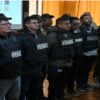Tehran: Iranians started voting on Friday for a new president following the death of Ebrahim Raisi in a helicopter crash, choosing from a tightly controlled group of four candidates loyal to the supreme leader.
Polls opened at 8am (0430 GMT) and close at 6pm (1430 GMT), but are usually extended as late as midnight.
Khamenei called for a high turnout to offset a legitimacy crisis fuelled by public discontent over economic hardship and curbs on political and social freedom.
“The durability, strength, dignity and reputation of the Islamic Republic depend on the presence of people,” Khamenei told state television after casting his vote. “High turnout is a definite necessity.”
Voter turnout has plunged over the past four years, as a mostly youthful population chafes at political and social curbs.
Manual counting of ballots means the final result is expected to be announced only in two days, though initial figures may come out sooner.
If no candidate wins at least 50% plus one vote from all ballots cast, including blank votes, a run-off round between the top two candidates is held on the first Friday after the election result is declared.
The next president is not expected to usher in any major policy shift on Iran’s nuclear programme or support for militia groups across the Middle East, since Khamenei calls all the shots on top state matters.
However, the president runs the government day-to-day and can influence the tone of Iran’s foreign and domestic policy.
A watchdog body made up of six clerics and six jurists aligned with Khamenei vets candidates. It approved just six from an initial pool of 80. Two candidates subsequently dropped out.
Prominent among the remaining are Mohammad Baqer Qalibaf, parliament speaker and former commander of the powerful Revolutionary Guards, and Saeed Jalili, a former nuclear negotiator who served for four years in Khamenei’s office.
Massoud Pezeshkian, is faithful to Iran’s theocratic rule, but advocates detente with the West, economic reform, social liberalisation and political pluralism.
His chances hinge on reviving the enthusiasm of reform-minded voters who have largely stayed away from the polls for the last four years after previous pragmatist presidents brought little change. He could also benefit from his rivals’ failure to consolidate the hardline vote.
All four candidates have vowed to revive the flagging economy, beset by sanctions re-imposed since 2018, after the United States ditched Tehran’s 2015 nuclear pact with six world powers.



